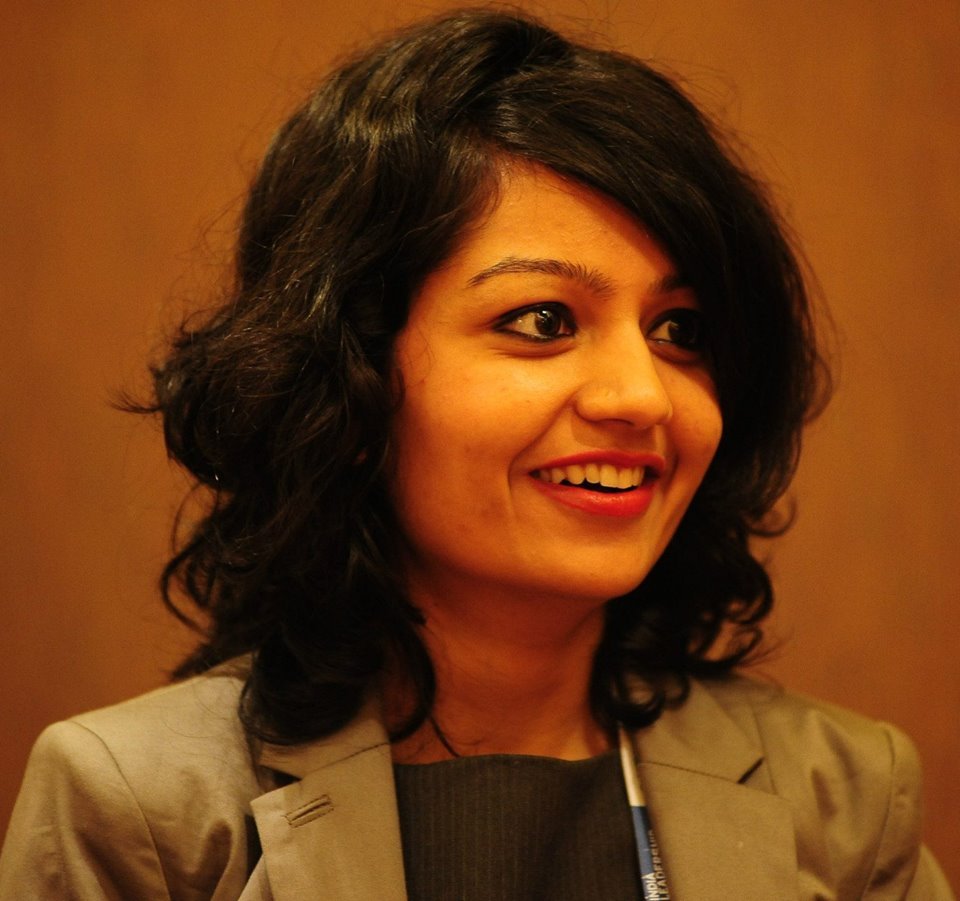Megha Bhagat is from the batch of 2003-2008. During her time in the college, she spent the last two years pursuing Human Rights by herself. Upon graduation, she pursued an LL.M. in Human Rights from NLSIU, Bangalore. She was offered a PPO from NASSCOM Foundation. In this interview, she talks to Shreya Vajpei about being the rebel, her time at AIL and her experience in the human rights sector.

Shreya Vajpei: Was law always your true calling?
Megha Bhagat: I wouldn’t call it a calling but from as long as I remember I wanted to study law or journalism! Law fascinated me more simply because it was intriguing as the basis of societal system and societal interaction. I was more keen on studying the various forms of justice mechanisms and the United Nations was a big fascination for me back in school. I also had friends from college etc. who were pursuing careers in the human rights sector and that definitely had an influence on me. System change and systemic narratives were the key cornerstones of growing up and law seemed like a resourceful way to understand the navigating pathways. Of course I found the black and white uniform very morose and dreamed of changing the dress code!
SV: How was your journey at AIL? (Especially, given that you were always a rebel.) What is your fondest memory?
MB: AIL was a mixed bag of stories. I wasn’t a student who scored great marks, I hadn’t figured how to write the exams well enough and I loved being in the real world interning with every possible avenue. In retrospect, I was also a difficult student and had my share of non-functional episodes with authorities, something that doesn’t make you their favourite and prone to a lot of hard backlash. My fondest memory is of the last two years and getting to be on my own. I remember the day college authorities told me I could study human rights law unsupervised, with the same schedule as everyone else and that gave me a free hand to explore my life with all the options. By the 4th year I also did end up making a few friends and finally learning to socialise in complete honesty. I guess I traversed college just like you are meant to- a little lost, a little rebellious, a little adventurous but more importantly finding your true self! Also my biggest gain was the amazing people I met outside the campus, people who were changing the world and were passionate about social change and solving real world problems; this stayed with me to influence my career decisions.
SV: For two years you were not on the rolls of the university. What fuelled such a choice? What were those two years like?
MB: It was in the 3rd year that I knew I wasn’t cut out for corporate or litigation. I was set on studying human rights and even if it meant doing it all on own I was relentless. It was surprising even for me since I wasn’t a bright student and the enormous responsibility of studying on my own hadn’t really hit home yet. Starting 4th year I spent quite some time negotiating my way through the system to be able to study human rights and that meant just very supervisory role of lecturers, Dr Tejinder Kaur Soni was my primary teacher at that point and would guide me about the basics but otherwise I had no lectures to attend and was on my own to figure the entire curriculum! It was exhilarating and adventurous at the same time. I started learning on my own and internet became my best friend. I travelled quite a bit and had some of my best interning experiences with amazing human rights activists and firms. These off campus interactions moulded my understanding of system change for social impact and paved the way for my specialisation. I became an ardent supporter of home tutoring and allowing every child to learn in their own ways and with their own methods and not compromising their skills with the intervention mechanism of the education model!
I also took a call to get into a masters course and my final year was spent working on getting through CLAT which was launched that year. I have some amazing memories of Mr. Sheetal Setia taking out time in the evenings to teach me jurisprudence all over again for my masters entrance and being thoroughly patient with my learning curve! Those two years I also learned what making and keeping friendships was like and today when I remember some names fondly and feel incredible proud of the feats they have achieved I can only give credit to my days at AIL! It can be daunting when you don’t have a classroom premise to stay tuned socially and exam times mean not having anyone to hash out your queries with but that’s when my corporate law counterparts would ensure I was not alone.
SV: Have you visited AIL recently? What changes did you notice in the college?
MB: Unfortunately I haven’t had a chance to go back to the campus but it’s on my list for sure!

SV: You pursued LLM from NLSIU, Bangalore. What was the preparation for the entrance exam like? Tell us a little about your time there.
MB: The CLAT was launched in the year 2008 and it was nerve wrecking not knowing what the new system of entrance would look like. I had to go back to the basics of law. Constitutional law pretty much formed the basis of the entrance exam. I had to redo my Jurisprudence curriculum and go to the core understanding of the various facets of the welfare basis of our Constitutional provisions. My time at NLSIU Bangalore was both that of amazing learning curve and building professional networks. Law school was unlike AIL and allowed me to continue pursuing my self-learning journey. I started learning human rights law as my specialisation and the professors were around to play a very minimal role of introducing you to thought processes and not how should it mould your thinking! This was also the campus where I concluded that I wasn’t going to pursue any field except social impact sector and the professors were really amazing in terms of guiding and supporting me!
SV: After LLM, you joined NASSCOM Foundation. How did the appointment take place?
MB: I was a final semester intern at NF for about 3 months and that led to a PPO before I headed back to complete my thesis. I would say that by that time I had made up my mind that I wanted to start out in the CSR space with a reputed organisation like the industry trade body and gave it all to secure an offer. Also my reporting supervisors, my peers were great teachers more than colleagues and it was incredible learning with them.
SV: What were your job responsibilities at NASSCOM? What is the working culture like?
MB: NASSCOM Foundation and NASSCOM have a very hands on learning work culture. Coming from a legal background and wanting to make a mark in the CSR field I was given every opportunity to unlearn and learn. I started out with leading CSR forums for the industry in Bangalore, Chennai and Hyderabad, which gave me the fundamentals of CSR within the ITeS-BPO industry and went on to establish operations for the Foundation in Bangalore. I also led a 2 year internationally funded grant project on social impact of non-urban BPOs along with researching and curating CSR stories for the industry. I was also involved in drafting policies for the disability sector and the nuanced CSR sector. I spent close to 4 years there in what has been my only “job” and those years formed the foundation for my extensive network in the industry. I saw the rise of the start up initiative, the formulation of the CSR law, the 5 year plans and it was an incredible learning curve for my career.
SV: You were also a Rockefeller Foundation Social Innovation Fellow. How did you learn about the fellowship? What was the application process like? What does the fellowship entail?
MB: The Fellowship is by nomination and the Foundation reaches out to you directly to apply for the program instead of it being an open application program. The application is a standard working professional program process asking for a statement of purpose, recommendations from your employer and your understanding of the social impact sector. The fellowship is one of the most interesting programs I have seen which brings together working professionals from different sectors for a year. We were 18 fellows from three thematic areas- digital jobs, climate change and universal health systems and we would get together once in every quarter in a different city of the world, learning from subject matter experts from the Stockholm School of Resilience and University of Waterloo while also meeting local NGOs who were doing ground breaking work in a specific social problem. As one of the youngest fellows I was constantly learning from not only the curriculum but the immense knowledge around me in the form of the fellows. Each one of them is leading solution creation for deep-rooted problems and I only feel fortunate to call them friends.

SV: You are currently working as a Consultant for various projects. Please tell us more about it.
MB: For the past 2 years I have been Consulting with organisations in the non-profit sector working on creating strategies for new programs. With the Institute of International Education I launched their 3 year commitment with Clinton Global Initiative working in the space of ‘Girls in Tech’ in India. The program has been working with school and university women on getting them excited about creating technology and being a part of the tech revolution. Over the past 3 years the program has touched close to 300 young women and hopefully got them to think about becoming techies. My other assignment includes working with the Anita Borg Institute helping them set up their university interventions for women engineering students and creating strategic intervention programs in collaboration with the tech industry. Over the past two years I have also been involved with a alternate learning centre in rural India called Project DEFY where I recently took on the role of a Director where in going forward we aim to create unsupervised, self and peer learning spaces for the local communities in various parts of the country.
SV: Any advice for the current AIL students who want to pursue a career in human right and public policy?
MB: Human rights is a highly misunderstood sector with its persona of being charity oriented overriding the opportunities it provides. Starting in the sector takes some more understanding of what are the avenues and a nuanced understanding of what inspires you to implement the law you have learned. It’s a personally rewarding sector for most of us and I guess all I can say is when you see the impact your work has on real lives you know that the choice was right.
Megha Bhagat can be reached at meghabhagat85@gmail.com.